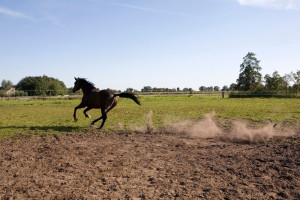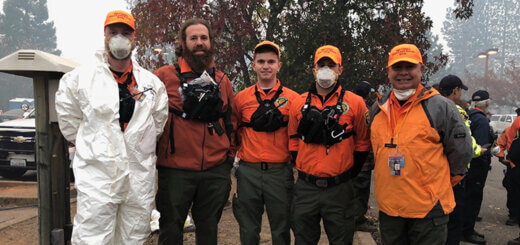Recap: Why has finding a cure been so hard, and can music help?
It’s yet another packed house at our education conference today in Petaluma, Calif. The morning started with The Pathological Course of Alzheimer’s Disease: Why Finding a Cure Has Been So Hard by Owen Carmichael, Ph.D., assistant professor, Department of Neurology at the University of California, Davis.
“Imagine you are a farmer and you leave the stable doors open,” he said. “What happens next?”
 The horses get out and start running around.
The horses get out and start running around.- They trample your crops
- They scare your chickens – which stop laying eggs
- They scare your cows – which stop providing milk
- They eat all the flowers you are growing for sale
- You can no longer sell wheat, eggs, milk or flowers
- Your farm income goes down
- You fail to pay the mortgage and the bank forecloses
How can you save the farm?
- Close the stable doors >> Damage is done, farm is lost
- Corral the horses >> Damage is done, farm is lost
- Plant new crops and flowers and calm the cows and chickens >> Damage is done, farm is lost
- Take out a loan to prevent foreclosure >> The horses are still running around, causing more of the same damage, the farm is lost
This analogy illustrates the challenges to finding new treatments for Alzheimer’s disease. Many of the treatments being studied only address one problem – and often when damage has already been done and it’s too late to reverse it. There are several different factors that contribute to the Alzheimer’s disease process. New treatments and research into the causes and prevention of Alzheimer’s will require a combination of approaches much earlier in the disease process if we are to see results. It’s hard to know which combination(s) will work at which stage in the disease and for how long!
Following Dr. Carmichael’s presentation, Julene Johnson, Ph.D., UCSF Institute for Health & Aging took the floor with Honey, They’re Playing Our Song: The Inspiring Connection Between Music and Dementia.
According to Dr. Johnson, music is processed by multiple areas of the brain – and those brain networks are generally less affected by Alzheimer’s disease. Familiar music may help access to meaningful memories in Alzheimer’s disease.
But she is also quick to clarify that the scientific evidence on music therapy is still inconclusive. “There is no substantial evidence to support or discourage the use of music therapy in the care of older person with dementia,” she says. “We don’t have good ways to test somebody’s knowledge about music and how they are processing music.”
So why does music seem to work with individuals with dementia? There are several reasons. First, music is strongly tied to our emotions: it can evoke emotions, is often present during events in our lives that have emotional meaning and can be a powerful cue to facilitate the recall of memories from our lives.
Music is also strongly tied to movement: specifically, music can give us an automatic urge to move in response, inspiring a “feel good” effect that requires both sensory and motor skills.
She recommends that music therapy can be effective with individuals with Alzheimer’s disease. It is something that exists in all cultures, it brings people together and aids in communication and shared emotional experience. Using music as therapy has the potential to enhance quality of life, reduce stress and agitation, provide for expression of emotions, inspire physical activity and promote dignity and respect.


















2 Responses
[…] knowledge about music and how they are processing music .†So why … Original post: Recap: Why has finding a cure been so hard, and can music help … Share […]
[…] a blog, the Alzheimer’s Association describes the disease like some horses ransacking a farm after the […]